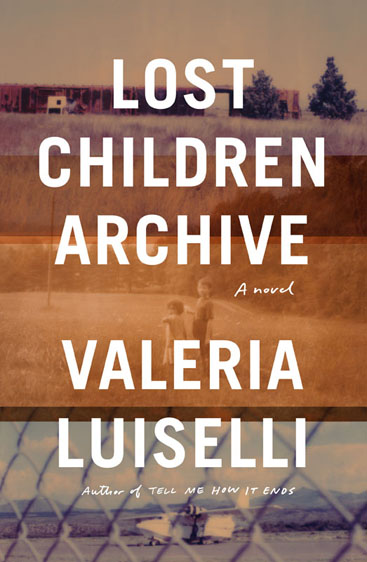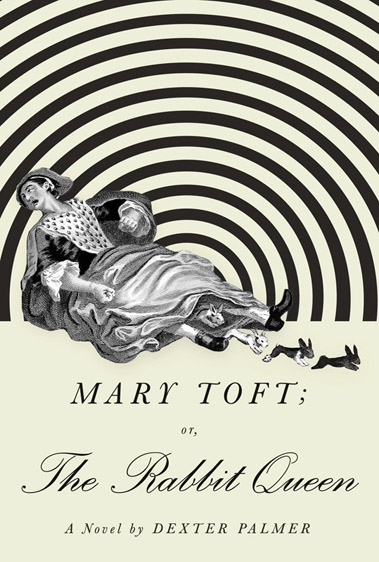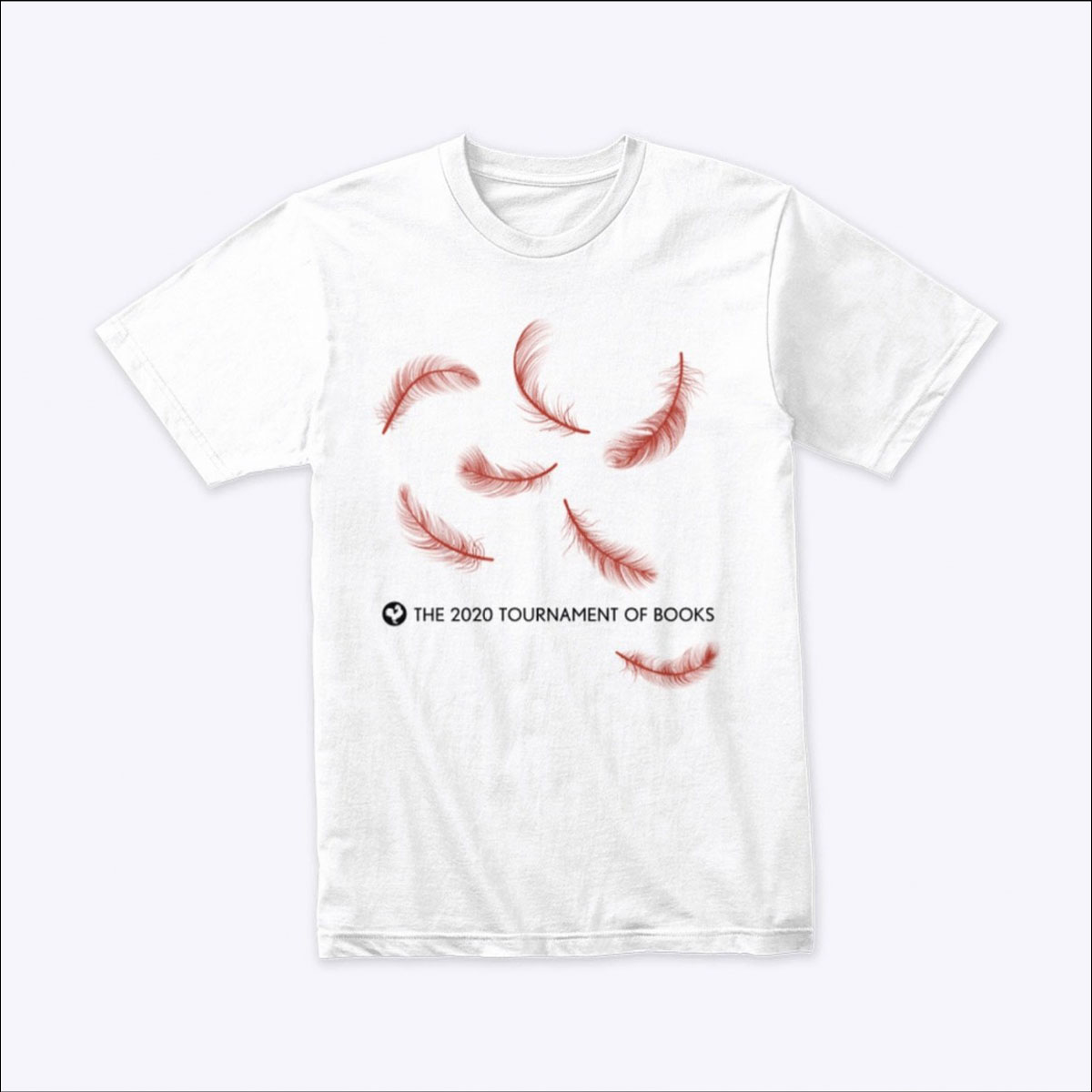-
March 11, 2020
Opening Round
-
Valeria Luiselli
1Lost Children Archive
v.
4Mary Toft; or, the Rabbit QueenDexter Palmer
-
Judged by
Meghan Deans
I’d like to let you know that both of these books have bibliographies. I did not find this intimidating because bibliographies are a sign that an author is not screwing around. It’s also a sign that they care about you, and that they don’t want you pausing to Google things every other page. They have already done the Googling for you! Rest there, in the book. See what comes of the reading.
Lost Children Archive by Valeria Luiselli is at once about one thing (refugee children at the southwestern border of the United States) and about a thousand things (refugee children anywhere, the state of being undocumented, documentary itself, borders, immigration, families, a family, stories, inherited stories, storytelling, being lost, becoming un-lost). There’s a road trip, the story of a family driving cross-country from New York to the southwestern United States. The parents met and married while working on a project to record every language spoken in New York, now their marriage is in trouble and they’re each planning new ventures. He wants to work on a documentary project about the Chiricahua Apache. She wants to work on a project about migrant children. Their projects intersect geographically, and their children are extremely good at entertaining themselves in a car, and so they drive.
But that plot is only a part of it. Lost Children Archive has ground to cover, and it’s a restless read. The narrative changes, the perspective changes, the format changes. There are stylistic devices, cultural references, quotations, citations, lists. There’s a novel inside a novel, a set of color photos, and one very long and unbroken sentence. It’s a first-aid kit of a book, filled with a small amount of everything you might need to address the wound at hand.
Somehow all of this doesn’t feel disorganized, or cold. In fact it jarred big emotions out of me, fury and despair and sometimes hope. The book seems primarily written from a place of search, an acknowledgment that it’s not always enough to tell a story. Sometimes you tell a story while examining the story, while interrogating perspective and ownership and narrative and history. Lost Children Archive’s constant shifting can be overwhelming—I often struggled to keep up with the stream of references—but each new device or frame or quote or structure felt like an offered coping mechanism, another chance to solve generations of tragedy. These characters are better read than I am, but we had the same questions. Why is this terrible thing happening? What does it mean? Why have we let it happen over and over and over again? How can we improve our ability to think about it clearly, critically, so that we do something other than scream?
Early on, the mother-narrator rereads Susan Sontag’s journals and observes:
…when I read Sontag for the first time, just like the first time I read Hannah Arendt, Emily Dickinson, and Pascal, I kept having those sudden, subtle, and possibly microchemical raptures—little lights flickering deep inside the brain tissue—that some people experience when they finally find words for a very simple and yet till then utterly unspeakable feeling. When someone else’s words enter your consciousness like that, they become small conceptual light-marks. They’re not necessarily illuminating…. Sometimes a little light can make you aware of the dark, unknown space that surrounds it, of the enormous ignorance that envelops everything we think we know. And that recognition and coming to terms with darkness is more valuable than all the factual knowledge we may ever accumulate.
The advantage of coming to terms with that darkness is, I believe, avoiding exhaustion—living to fight another day. The disadvantage is that darkness is dark, and in darkness some elements will remain unknown, their investigations flawed. I was most frustrated by the father’s interest in the Chiricahua Apache, in the way he seems to frame their story as past and past only, calling them “the last of something.” (I would very much like to read an Indigenous reader’s perspective on this novel.) The children, too, seem somewhat otherworldly—their observations sometimes faltering on the line between genuinely surprising and that Twitter meme where fictional toddlers speak too wisely about the global economy.
When the afterglow of the read had faded, I wondered if the book had gotten away with something, if somehow the structure of it had kept me engaged without landing me anywhere new. Sometimes novels about contemporary events are called “urgent,” but for me the most urgent passages of this novel are not in its stories of crisis but in its attempt to reckon with that crisis and its origins. Having that space to reckon is a privilege, reckoning is preferable to forgetting, but is it enough?
Mary Toft; or, the Rabbit Queen by Dexter Palmer is similarly a novel of reckoning, but one that reads very differently. This is a neatly organized historical horror tale, sharply written, loaded with philosophy, and based on the kind of true event that seems at once extremely unbelievable and absolutely like something that could happen tomorrow. Set in England in 1726, it’s the story of a country doctor and his young apprentice, called to the bedside of Mary Toft, a woman who has mysteriously begun giving birth to dead rabbit parts. It’s impossible, a fraud, but the doctors and clergy who examine Mary all believe it. As national interest in her story grows, Mary is hauled off to London, where a crowd of true believers gather, high society gapes, and the young boy-apprentice observes all sorts of foul human behavior.
This is a sure-handed, muscular novel that doesn’t pull a punch, not even when I really, really wished it would. In the world of Mary Toft, what’s gross is gross, what’s cruel is cruel, and what you’d like to call an unthinkable act is shown clearly to be, for many people, an opportunity for fame and fortune. The book works rich ground, turning over pointed questions about hoaxes and what they tell us about ourselves. Why are we anxious to believe the unbelievable? Why do we find entertainment in the grotesque? Why is cruelty a form of entertainment? Why do we constantly find hope in shameless lies?
I am also interested in those questions, but I found it difficult to align myself with Mary Toft. Perhaps there was never going to be any getting over the horrific how-to of the hoax itself—to prove her lie, Mary repeatedly gives “birth” to those rabbit parts, and each time she’s in excruciating pain, pain I found difficult to stomach. I steadied myself through the tougher passages thinking that surely the reward for witnessing this woman in pain would be access to Mary herself, but when that access was granted I felt it was too brief, and too unsatisfying. What I wanted was the story of Mary Toft. What I got instead was the story of Mary Toft.
I felt sheepish admitting this, at first, but this happens all the time! It’s normal! I read something, I want something from it, I don’t get it, and what then. Act like I never wanted anything, like anticipation of a story’s direction isn’t part of reading, like I possess some kind of objective readerly virtue? That’s a hoax, too. I can see the story told by Mary Toft and I can say it’s not for me, that the work done here is good work but it pushed me away when I was anxious to be closer.
That said: This book is so smart. In spite of my dissatisfactions I found myself highlighting passage after passage, hoping I’d remember them and not just look back on this book and think: dead rabbit parts. I read Mary Toft after reading Lost Children Archive and I believe that reading these books in that order made me a little more open to seeking the sparks in Mary’s darkness. Here, a beautiful passage from the country doctor’s plea to Mary Toft, once he’s realized her ruse:
Here is what you need to understand—here is why you are in danger. Here is why you must speak, and why you must not allow us to speak for you. Because history is an act of continuous collective imagining, and the perception of truth is a constant, unending negotiation with others, and with oneself when one is alone…. And I will tell you this about God—that despite his presumed omnipresence he often arrives in the company of men; that men fear to interpret the world on their own authority when they are aware of his presence, because his senses are complete and perfect and his experiences are unlimited; that the standards for proof are much higher when God is involved, especially proof of life, or of what goes on inside a woman’s body; that weighed against God’s displeasure, or against a man’s feeling that God is displeased by his actions, the life of one woman is no great thing.
“History is an act of continuous collective imagining” would have made a much better, much shorter review of Lost Children Archive, and I got a thrill when I read it, like I’d found something to add to the Archive’s search. I don’t necessarily need novels to solve problems, but I do depend on them to keep my head and heart strong enough that I don’t go running from every terrifying thing. By that metric, Lost Children Archive is a powerhouse, a strengthener. That’s my winner.
Match Commentary
By Melanie Greene & Andrew Womack
Andrew Womack: This year we’re trying something new in the commentary booth. We had so many wonderful entrants for this year’s ToB Reader Judge that we decided that even though we selected just one Reader Judge for 2020—Heather Cothran, who decides one of our quarterfinal matches—we wanted to invite our other finalists to join us here in the booth throughout the Tournament. And first up is Melanie Greene!
Hello Melanie, and it’s great to have you with us today. Let’s get started with you telling us a bit about yourself.
Melanie Greene: Excited to be here! I am one of those people (hello, commentariat friends) who defines herself by her love of books. I’m told that reading tons isn’t actually a character trait, but that didn’t stop me when I was reading while walking to and from grade school, and it’s not stopping me now that I’m 50. I met my Irish husband while we were getting writing degrees in England, and brought him back to Texas with me. Our sons grew up and moved to California, so now they’re even more liberal than me. My ninth contemporary romance came out this year, which means I should be working on the tenth instead of spending all month refreshing the ToB site. (Spoiler alert: I’m not.)
Andrew: I can rave on and on about Lost Children Archive. In the parlance of Judge Deans, the afterglow of that novel hasn’t left me since I finished it during Camp ToB—which it won, earning the book a place in this year’s Tournament. And I can particularly relate to this in her judgment: “I read something, I want something from it, I don’t get it, and what then.” Whatever it is—books, movies, music—I feel this incredible letdown when it doesn’t go as far as I’d hoped it would. What about you?
Melanie: Lost Children Archive is the rare and special kind of book that I feel more enthralled by the more I reflect on it and discuss it. I’m very much Team LCA this tournament, as I was during Camp ToB. Like Judge Deans, I “wondered if the book had gotten away with something, if somehow the structure of it had kept me engaged without landing me anywhere new.” Because the structure feels, well, very archival. The audiobook added to the experience; the sound effects resonated so well with the main characters’ jobs. And as it turns out, I like putting the pieces together. Former ToB contenders A Visit From the Goon Squad and Building Stories had a similarly fun-for-me quality. (Sorry, Bats of the Republic; you tried.)
To me, LCA didn’t get away with anything. Instead, it hooked into me and carried me along. My only letdown was that the father never stopped being so self-absorbed. Mary Toft; or, the Rabbit Queen, on the other hand, was trickier for me to love. I went into this match with high expectations for both books, and Lost Children Archive well exceeded them. Mary Toft didn’t. I find the letdown is keener when I go in with strong expectations, and in this case, I just wanted something slightly different than I got. I wanted either more interiority from Mary, or for the novel to focus more sharply on how everyone objectified her. Palmer writes so well, and I loved how many ways he showed people taking what they wanted from Mary Toft’s hoax without a care about the woman herself. But I felt like I was doing some of that digging myself, and the structure of the novel wasn’t built for that kind of excavation.
Andrew: I haven’t read Mary Toft, but I loved The Favourite, where Queen Anne is shown as having 17 pet rabbits—one for each of her dead children. So, right, I was confused as to what kind of connection, if any, there was here. It seemed like there was? Thankfully, in an interview with Dexter Palmer, Alicia Kort wrote about this very topic over at Electric Literature, and cleared up my confusion. Apparently, Queen Anne never owned rabbits.
This is all to say, rabbits are creepy, aren’t they?
Melanie: So creepy. My childhood best friend kept rabbits, and they still sometimes show up to stare unblinking at me in my dreams. I first heard of Mary Toft a few years ago and imagined—or to be accurate, tried not to imagine—those creatures, and was relieved I was done with my own reproductive system. But just before reading Palmer’s novel, I listened to an episode of The Dollop podcast about Mary Toft, and learned she used rabbit parts, not live bunnies. Not much more comfortable to imagine, but at least there weren’t any unblinking eyes involved. I didn’t realize before the Electric Lit interview that the novel uses Hogarth’s print of Mary Toft; the way the cover designer isolates her and the rabbits is even creepier than my friend’s nightmare pets.
Andrew: No, just, no. Effective, but no.
You previously told us that you read 300 books a year. We need to know more about this time machine you’ve built.
Melanie: About half of that is romance, which tends to read more quickly than non-genre books. But yes, I’m an outlier. A “fun” “game” in middle school was when the popular kids would time me to see how quickly I’d finish a page as I read in the lunch line. I’ve gotten faster since then; I rarely listen to audiobooks at less than 1.5 speed; I keep most of my reading on my phone and any two-minute space while food heats up or a line inches forward is a chance to read more.
Andrew: This is how you do it, people. Learn from the best. Thank you so much for joining us today, Melanie!
We’ll see you tomorrow when Jenny G. Zhang decides between Girl, Woman, Other by Bernardine Evaristo and Nothing to See Here by Kevin Wilson, and John and Kevin are back in the booth!
New 2020 Tournament of Books merch is now available at the TMN Store. As a reminder, Sustaining Members receive 50 percent off everything in our store. To find out why we’re asking for your support and how you can become a Sustaining Member, please visit our Membership page. Thank you.
Welcome to the Commentariat
Population: You
To keep our comments section as inclusive as possible for the book-loving public, please follow the guidelines below. We reserve the right to delete inappropriate or abusive comments, such as ad hominem attacks. We ban users who repeatedly post inappropriate comments.
- Criticize ideas, not people. Divisiveness can be a result of debates over things we truly care about; err on the side of being generous. Let’s talk and debate and gnash our book-chewing teeth with love and respect for the Rooster community, judges, authors, commentators, and commenters alike.
- If you’re uninterested in a line of discussion from an individual user, you can privately block them within Disqus to hide their comments (though they’ll still see your posts).
- While it’s not required, you can use the Disqus
tag to hide book details that may spoil the reading experience for others, e.g., “ Dumbledore dies .” - We all feel passionately about fiction, but “you’re an idiot if you loved/hated this book that I hated/loved” isn't an argument—it’s just rude. Take a breath.



